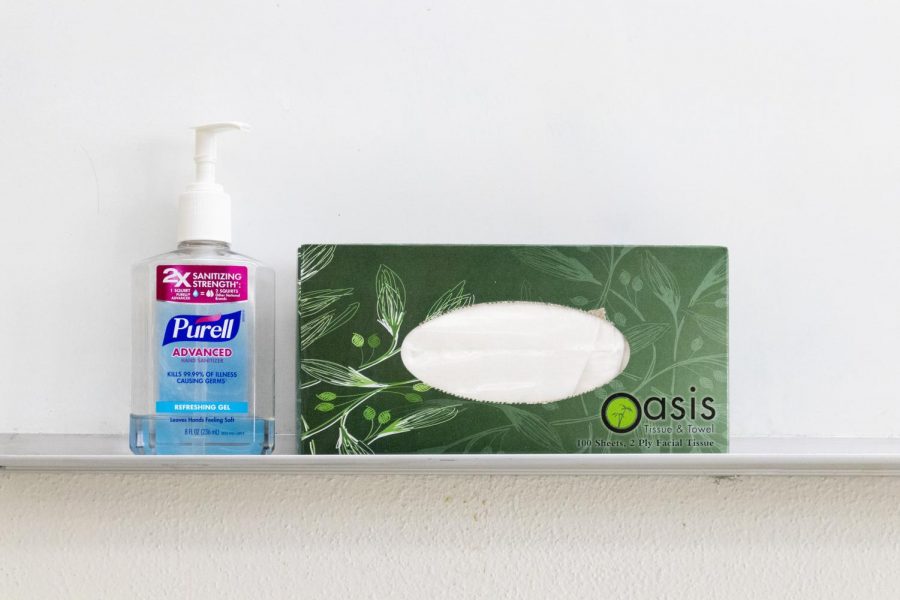The Coronavirus: The Myths, The Facts, and What La Salle Students Can Do
Hand sanitizer is one method to prevent the spread of illness.
March 4, 2020
Late last week, an elementary school in Lake Oswego was shut down after a school employee was diagnosed with COVID-19. Given La Salle’s close proximity to the source of a potential outbreak, it is important that the community understands what the coronavirus is, what it isn’t, and how La Salle can combat it.
The new coronavirus that has recently spread throughout the globe has been declared an international health crisis by the World Health Organization (WHO). Since the outbreak was detected in late December of 2019, the virus has been reported in 82 countries, with over 95,000 confirmed cases and 3,200 deaths worldwide.
As of March 4, the Center for Disease Control (CDC) reported that the United States has a total of 80 cases and 11 deaths. Ten of these have occurred in the Seattle area, which is less than 200 miles from Portland. Researchers speculate that the virus has been circulating unnoticed throughout the Pacific Northwest for weeks.
This situation is constantly developing, and new information is being released daily. If you want to stay up to date, the Center for Disease Control and the World Health Organization are both good resources. People are encouraged to stay up to date on the status of the virus, as there is no sign that the outbreak will slow down anytime soon.
What is the coronavirus?
The new coronavirus is officially known as COVID-19. It is caused by the virus SARS-CoV-2, which is part of a family of coronaviruses that cause the symptoms of the common cold and pneumonia, as well as the far deadlier SARS (Severe Acute Respiratory Syndrome) and MERS (Middle Eastern Respiratory Syndrome).
The virus is especially dangerous to people who are immunocompromised. Elderly people, very young children, and people with pre-existing medical conditions such as asthma, heart disease, and diabetes are the most vulnerable. A mild or underlying case of the virus in one person still has the potential to infect another at-risk individual.
There is currently a global effort towards the creation of a specialized COVID-19 treatment, but no vaccine exists yet. Currently, treatment options mainly consist of symptom relief — and in extreme cases, support of vital organ functions such as respiration and dialysis.
What is the administrative team doing?
On Sunday, March 1, Principal Andrew Kuffner sent an email addressing the coronavirus out to the families of La Salle students. The message was posted on the La Salle website and on Schoology March 2. “We are taking this development seriously, and are responding to it with a plan that focuses on communication, safety, and academics,” Mr. Kuffner said.
The letter advises the student body and their families to stick to the school guidelines on illnesses and to follow recommendations from the CDC and Oregon Department of Education. The administration will also be conducting surveys on the symptoms and conditions of students who are home sick.
If La Salle is shut down in the event of a student case of the coronavirus, digital learning days, such as the ones that take place during snowstorms and severe weather events, would be used to ensure that student academics do not fall behind schedule.
What are the symptoms of the coronavirus?
The coronavirus causes symptoms that are very similar to the flu, although the severity of cases ranges from a mild cold to pneumonia, depending on the patient. Shortness of breath, a dry cough, a stuffy nose, fever and chills, and fatigue are all symptoms of COVID-19. “While information so far suggests that most COVID-19 illness is mild, a report out of China suggests serious illness occurs in 16% of cases,” the CDC said.
How does it spread?
COVID-19 is an airborne contagion, and its methods of transmission are very similar to those of the flu or the common cold. Experts believe that the virus spreads through droplets from coughs and sneezes. These droplets cannot penetrate the skin, but if they are brought into contact with the face, the likelihood of infection is very high.
What can students do to protect themselves?
Simple and straightforward methods to staying healthy have proven to be the most effective: students should be washing their hands, coughing into the bends of their elbows, and avoiding touching their hands to their faces.
The CDC recommends that people thoroughly wash their hands for no less than 20 seconds with soap and hot water, making sure to clean their fingertips, fingernails, wrists, and between their fingers.
Not only should you wash your hands thoroughly, but you should also wash them frequently. In order to stay safe, you should wash your hands before and after entering public areas, eating meals, touching doorknobs, handling money, using A.T.M.s, interacting with vending machines, using school computer keyboards, writing on public notepads, or shaking someone’s hand. Hand sanitizer is helpful if there is no other alternative, but soap-and-water handwashing is always preferable. Disinfecting phones and iPads is also highly recommended.
Traditional and herbal remedies, as well as self-medication such as antibiotics, will not protect against infection. Purchasing a face mask is not necessary, as it will not stop you from contracting the virus. However, it does keep you from touching your face.
Experts will also give face masks to people who are infected so as to keep the droplets from dispersing when they exhale. However, people are buying up the stocks of face masks, and healthcare officials risk infection if they cannot get the supplies they need.
In conclusion:
COVID-19 is an extremely concerning outbreak due to the threat that the coronavirus poses to vulnerable groups and communities. Everyone is susceptible to infection, but practicing good hygiene is the most effective way to keep yourself and others healthy. Staying up-to-date on the situation in the U.S. and abroad is advised.
Correction: March 5, 2020
An earlier version of this story incorrectly identified the SARS virus as “South Asian Respiratory Syndrome” instead of “Severe Acute Respiratory Syndrome.






John Cipolla • Mar 5, 2020 at 8:09 am
Honest kind of cool that our school is taken action on this. I’d prefer if we had DLD as the Corona Virus is kind of over hyped. If that big of a concern just have a DLD for a while. Just an opinion.
Robert Brotherton • Mar 4, 2020 at 9:55 pm
And let’s not forget that buying out Costco’s entire supply of Mac & Cheese and toilet paper isn’t going to help either.
Long Tran • Mar 4, 2020 at 9:52 pm
Dang. It is really serious for a lot of people around especially in the US. It’s a good way to keep us safe by wash hands and hand sanitizer. .